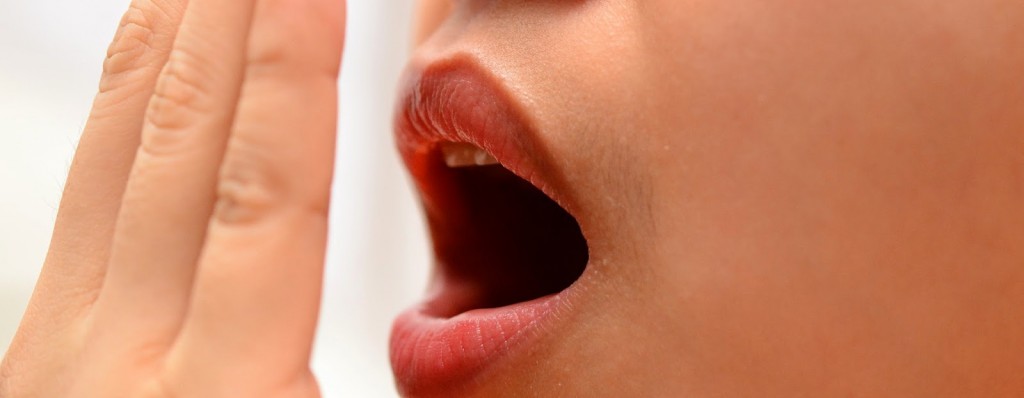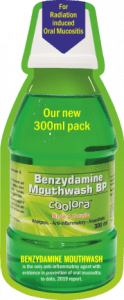Menu

Date: 6th. Jan.,2017
If you wonder why people keep their distance from you or why that perfect date didn’t end so well, the cause could be bad breath. After dental caries and gum disease, bad breath or halitosis is the most common ailment for which people consult a dentist. In fact, halitosis is said to plague one person in four around the world!
Even though halitosis is easy to avoid, it is so widespread because many are not even aware that they have bad breath. Since you get used to the smell of your own breath, it is very difficult to detect bad odour. Moreover, it is the source of anxiety, embarrassment, and low confidence for those suffering from it.
Most people check how their breath smells by breathing into cupped hands and sniffing immediately after. However, this method is not effective since you’re acclimated to your breath. To be more effective, you can use any one of the following methods:
Wrist Method:
Tongue/Cheek Swab Method:
Besides the methods mentioned above, you can also ask for an honest answer from someone you’re close to like a spouse, sibling or parent.
In order to prevent bad breath, it is vital to know what is reason for it. Here are some of the most common causes for halitosis:
The most common cause for bad breath is poor oral habits. When you don’t brush and floss regularly, food residue stuck in your teeth is not removed properly. The bacteria in your mouth feed on the stuck food particles and produce compounds that leave a foul odour. Continued food particle accumulation also leads to cavities and other periodontal diseases.
The most distinguishable symptom of dry mouth is a rough cotton-like feeling in your mouth. If your saliva flow slows, your mouth becomes dry and causes bad breath. Saliva is a natural cleanser that keeps your mouth moist, preventing odour. Excess alcohol and coffee consumption, mouth breathing, medicines, or diseases like xerostomia can cause dry mouth. Products like Wet Mouth can also help in keeping your mouth moist.
Over time, tobacco products leave their distinct odour in the user’s mouth, which is also called ‘smoker’s breath’. The tobacco and chemicals released during tobacco consumption reduce the salivary flow and cause dry mouth, which in turn, causes halitosis.
Some foods like garlic and onion can cause bad breath, too. While these are relatively temporary and superficial, these odours can also last for days. By brushing after consuming such foods can help in eliminating bad breath.
When you use dentures or dental appliances, it is easier for food particles to get stuck. As mentioned earlier, stuck food cause mouth bacteria to thrive and release bad odour. In addition, it is more difficult to brush and floss with dentures.
Special toothbrushes like Clinsodent Brush and interdental brushes like Thermoseal Proxa are great tools for brushing your teeth when you are using dentures or braces. You can also use denture cleansers like Clinsodent Powder and Clinsodent Tablet to clean your dentures and kill the odour-causing bacteria on its surface.
Though uncommon, halitosis or bad breath can also be a result of systemic causes like uncontrolled diabetes, lung infections, persistent cold, gastroesophageal reflux disease, ketoacidosis, bronchiectasis, etc. This kind of halitosis will persist despite having immaculate oral hygiene. To get rid of bad breath caused by systemic causes, the underlying condition must be treated.
By regularly brushing and flossing, you can keep bad breath at bay. Following a dental routine removes the plaque build-up which is responsible for halitosis. But remember, by brushing too hard or too frequently (more than thrice a day), you can harm your teeth by damaging its enamel layer.
You should also use an antiseptic mouthwash like Hexidine as they not only freshen your mouth, but also eradicate any mouth bacteria. Moreover, there is a coating that forms on your tongue, which is full of smelly bacteria. By brushing your tongue using a tongue brush like Glosso Tongue Brush, you can tackle halitosis at its source as it gets rid of bacteria as well as dead cells.
You can also consider using halitosis management kits like Halyx that contain all necessary tools like chlorhexidine gluconate mouthwash (Hexidine), tongue brush, sugar-free gums, interdental brush (Thermoseal Proxa), and fresh breath spray (Wassup) to fight bad breath.
Since tobacco is a major reason for bad breath, quitting its use is a no-brainer. Tobacco use is not only detrimental to your breath quality but it also stains your teeth, damages gums and causes dry mouth. Moreover, prolonged use also causes periodontal diseases and oral cancer. Since quitting is no easy feat, you can use nicotine patches or gums to keep the urge under control.
By drinking 8 to 10 glasses of water a day, you can keep your mouth moist. This will prevent bad odour and even tooth decay. To stimulate saliva production, you can also use sugarless gums or hard candy. However, make sure that you avoid sugary drinks.
Instead of going for sugary and oily snacks, you can choose carrots, cucumbers, celery, or apples to satiate your hunger pangs. Crispy fruits and vegetables increase your saliva production, which keeps halitosis in check. Moreover, this approach will also help you lead a healthier lifestyle.
So now that you know what causes halitosis and how to prevent it, you can effectively keep your breath fresh.
References:


| PRODUCTS | QTY | PRICE | VALUE in INR |
|---|
| PRODUCTS | QTY | PRICE | VALUE in INR |
|---|
One thought on “What Causes Bad Breath and How to Get Rid of It”